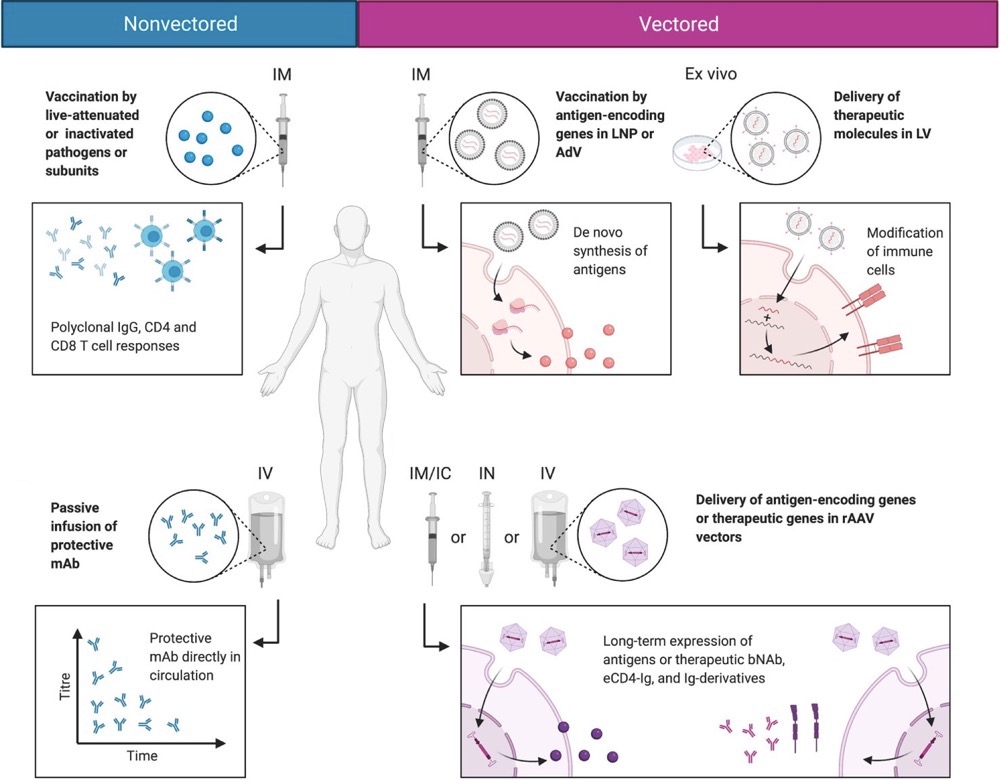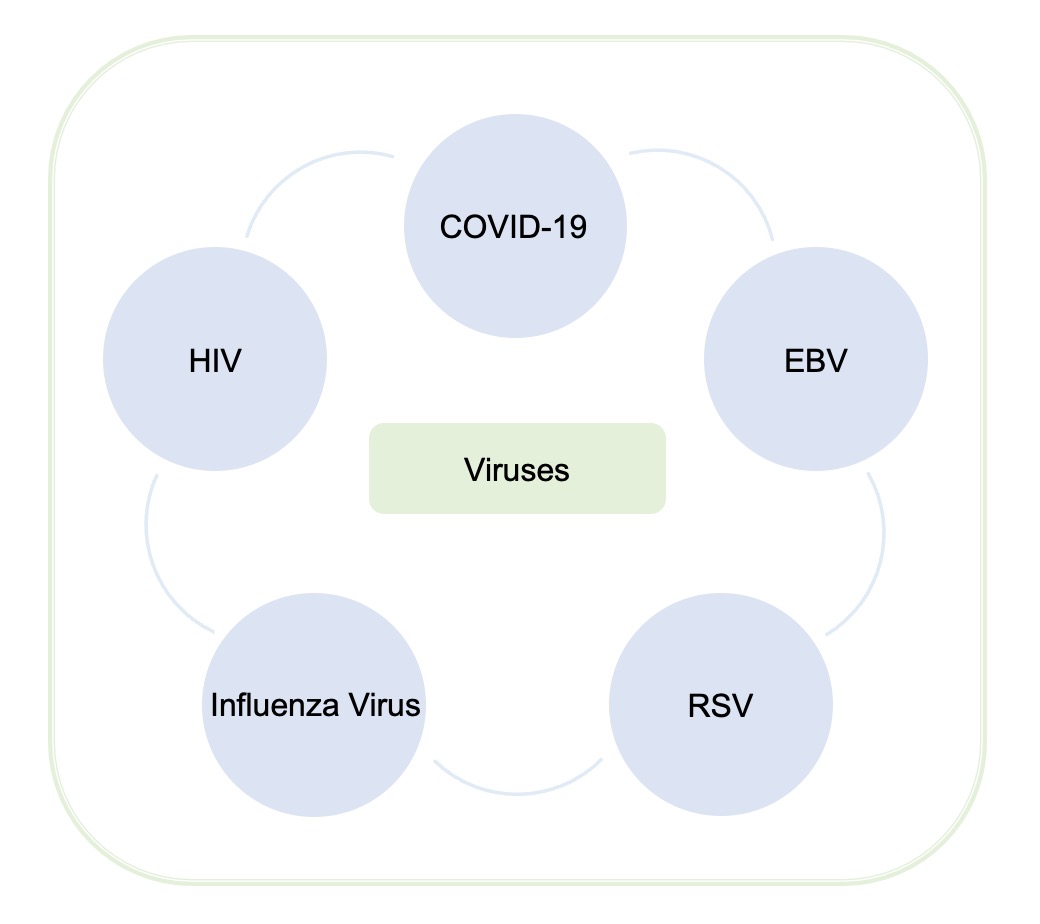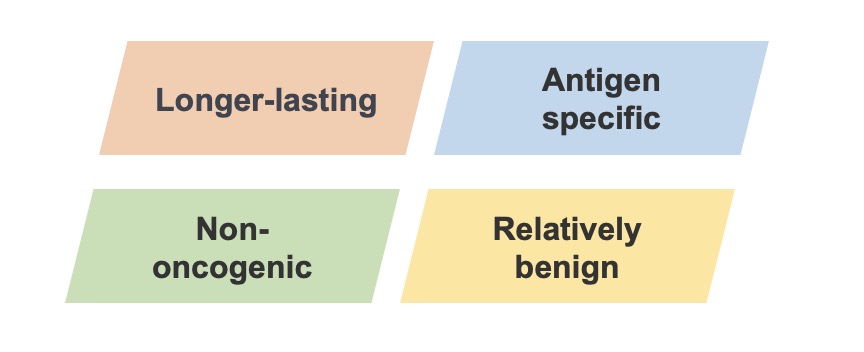Viral gene delivery systems take advantage of the virus's natural ability to evade host defense mechanisms and transfer genetic material within cells. It has higher delivery efficiency and is more immunogenic than other methods. Adenovirus vectors (AdV) and lentiviral vectors (LV) are currently the most common viral vector platforms. AdV is attractive for infectious disease vaccination because of its large capacity, mediating rapid gene expression, effective activation of the innate immune response, and induction of strong Th1 polarized adaptive immunity to transgenic products. LV uses the ability of lentiviruses to mediate the semi-random integration of DNA into the host cell genome to achieve long-term transgenic expression.
 Fig.1 Comparisons between non-vectored and vectored immunotherapeutic strategies. (Zhan, et al., 2021)
Fig.1 Comparisons between non-vectored and vectored immunotherapeutic strategies. (Zhan, et al., 2021)
Creative Biolabs offers one-stop solution B cell engineering services to express pathogen-specific antibodies to prevent infection. In detail, we design B cells through different genome editing methods. When the body senses any infection, B cells mature into plasma cells, which release protective antibodies to fight an impending infection and prevent future infection. Plasma B cells can be used as protein-replacement engineered cell therapies because they have long lifespans and secrete high levels of protein. It can be used to treat many diseases, including cancer, viral diseases, and autoimmune diseases. Creative Biolabs tailors the plan to your project needs and provides detailed processes and accurate results.
 Fig.2 Types of different viruses. (Creative Biolabs)
Fig.2 Types of different viruses. (Creative Biolabs)
| B Cell Engineering Service for Anti-COVID-19 Antibody Delivery |
| Creative Biolabs offers precise B cell genome editing techniques, such as CRISPR/Cas9-based Genome Editing. With this premise, B cells can be engineered into antigen-specific, universal donor, perpetually viable, long-lasting, non-oncogenic, relatively benign, antibody-producing cells which may serve as an effective vaccine for COVID-19. |
| Learn More |
| B Cell Engineering Service for Anti-HIV Antibody Delivery |
| Creative Biolabs engineers primary B cells with precise genome editing techniques, which replace endogenously encoded antibodies of primary human B cells with antibodies that target HIV. The engineered B cells enable immunological memory and clonal selection that may contribute to addressing viral variability and to counteracting viral escape. |
| Learn More |
| B Cell Engineering Service for Anti-RSV Antibody Delivery |
| Creative Biolabs engineers primary B cells with precise genome editing techniques, which replace endogenously encoded antibodies of primary human B cells with antibodies that target RSV. The engineered B cells enable immunological memory and clonal selection that may contribute to addressing viral variability and to counteracting viral escape. |
| Learn More |
| B Cell Engineering Service for Anti-Influenza Virus Antibody Delivery |
| Creative Biolabs' B cell engineering service for anti-influenza virus antibody delivery involves both innate-like and conventional B cells, which provide early and later immune protection. Engineering B cells with precise genome editing techniques to adapt to the ever-changing influenza virus will enhance overall protection. |
| Learn More |
| B Cell Engineering Service for Anti-EBV Antibody Delivery |
| Creative Biolabs offers precise genome editing techniques to engineer B cell, which can secrete EBV antibodies after expansion and differentiation. Our genome editing techniques can be successfully applied to primary human B cells and will also enable studies into the functional interactions between EBV and its primary host cells. |
| Learn More |
B cell engineering for anti-virus antibody delivery has been proven to be an efficient strategy to develop a safe, effective, and long-lasting vaccine.
 Fig.3 Features and benefits of B cell engineering for anti-virus antibody delivery. (Creative Biolabs)
Fig.3 Features and benefits of B cell engineering for anti-virus antibody delivery. (Creative Biolabs)
Q1. What are the differences between vaccine and B cell engineering therapy?
A: The fundamental mechanism of many vaccines is the production of antibodies by activated B-cells. However, this approach has its own handicaps particularly pertinent to RNA viruses. While engineered B cells technology may resolve this difficulty. For example, B cells may be aimed at the sufficient expression of the specific antibody, or negligible or no expression of the unintended antibody, or higher temporal viability of the so-engineered B-cell clones inside the body.
Q2. What is the mechanism of B cell engineering for anti-virus antibody delivery?
A: B cells achieve this target by rearrangement of the three imperative components of the antibodies in their genomes, the V, D and J regions.
Professional consultation provides guidance before, during and after the project, please contact us for your tailored solution.